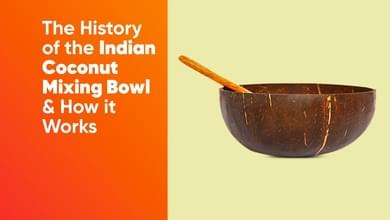
The History of the Indian Coconut Mixing Bowl & How It Works
Published on 2/5/23
Picture an idyllic beach in the South Pacific or the Indian Ocean. One thing immediately comes to mind: palm trees swelling with coconuts. Coconuts are not just great for pina coladas but also for cannabis fans. Coconut and cannabis already have a decent overlap, but an ancient trend has become reinvigorated for a modern audience, leading to the popularity of the coconut mixing bowl. What is this type of mixing bowl, and what does it mean for the adventurous stoners among us?
Old and New
It is hard to overstate the importance of the coconut to southern hemisphere cultures. Just as Americans associate particular produce with our national identity, such as George Washington's cherry tree, so does folklore, legend, and culture all coalesce in the coconut for people who live between Africa and Fiji. Indian literature from thousands of years ago references the coconut, suggesting that it may have originated there and followed humans across oceans and hemispheres. Few cultural keepsakes and trinkets are more appealing today than India's coconut shell bowls.
What is true for coconuts is true for cannabis, whose roots originate in southern Asia. The history of cannabis is long, tangled, and not always clear (much like cannabis itself). In fact, low-potency cannabis remains legal in India today, having never been outlawed. Coconut bowls have been a popular choice among native Indians and members of its diaspora for as long as they have been using cannabis. Why does it prove so popular?
What's in a Name
The process of making a coconut bowl is relatively easy, unlike some DIY cannabis projects that take hours or even days. You need a coconut, a saw, a knife, sandpaper, and some vegetable or olive oil. Use the saw to cut the coconut in two (it does not need to be perfectly even), drain the coconut milk, and use the knife to remove the flesh by prying it away from the husks. Sand down both the interior and the exterior of these two halves. Make the bowl waterproof by applying layers of oil, about half a dozen or so, re-applying each one after it dries out.
Mixing Cannabis
There are several reasons why you may want to use the coconut bowls India so proudly relies on. For starters, they are eco-friendly and aesthetically pleasing, much more so than your average mix plate. (Although plenty of artistic mix plates make it possible to show off your style.) Additionally, they are lightweight and easy to move or store. Finally, they impart a bit of flavor to your bud while retaining the residual bud or kief that you enjoyed last time.
Mixing together cannabis and hash, tobacco, herbs, or incense in a coconut bowl is straightforward. You can either carefully combine the ingredients or throw everything together and shake it up like a bartender mixing a cocktail. Either way, remember to clean out the bowl after use: the waterproofing makes it possible to run these bowls through the dishwasher without harm.
Where To Buy an Indian Coconut Bowl
DifferentWeed
The British cannabis company DifferentWeed has something for just about everyone, which may be surprising since cannabis prohibition in the U.K. remains in full swing. At just three pounds (about $3.50), their coconut mixing bowls are both beautiful and dirt cheap. Crafted from natural coconuts and polished to a sheen, these mixing bowls provide both aesthetics and practical use. They have been designed to be nearly impossible to spill, indicating how well a coconut husk can stay balanced even when people and pets threaten to tip it over.
Black Leaf
The German company Black Leaf claims to have more cannabis accessories on hand than any of its competitors. With a database of thousands of products, it is hard to argue. When it comes to a simple coconut bowl, they deliver: their mixing bowls cost 5.50 Euro (about $6) and can be shipped to the United States in 24 hours. With a diameter of 110 millimeters (about 4.5 inches), these are small enough to be both curious and practical.
Cannabis Sommelier
This Zurich-based cannabis accessory company spares no words regarding their products: their coconut mixing bowl is only described as "big." At $12.50 (the exchange rate for Swiss francs and U.S. dollars is nearly one-to-one), it is a bit more expensive than some other bowls, but given its size, that may be a price worth paying. These handmade bowls can be shipped anywhere in the United States without needing to clear customs.


















